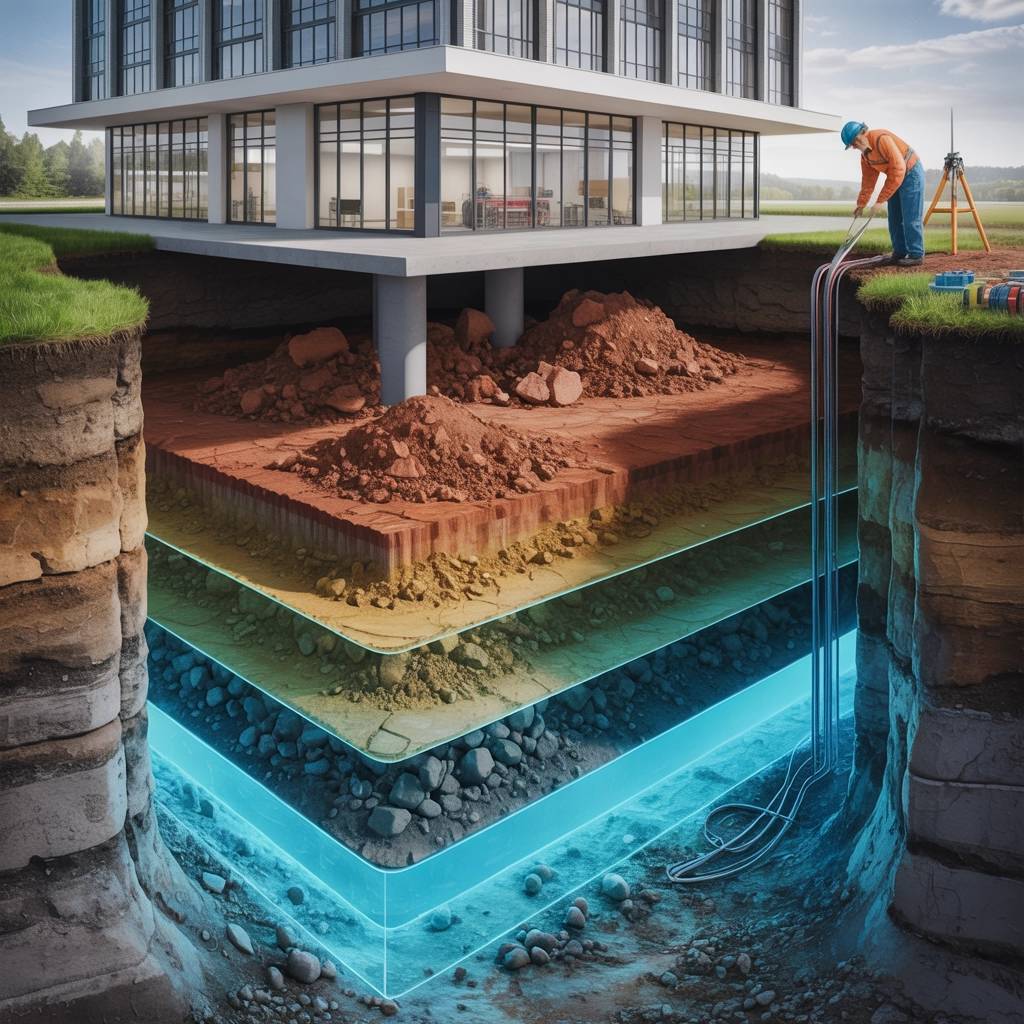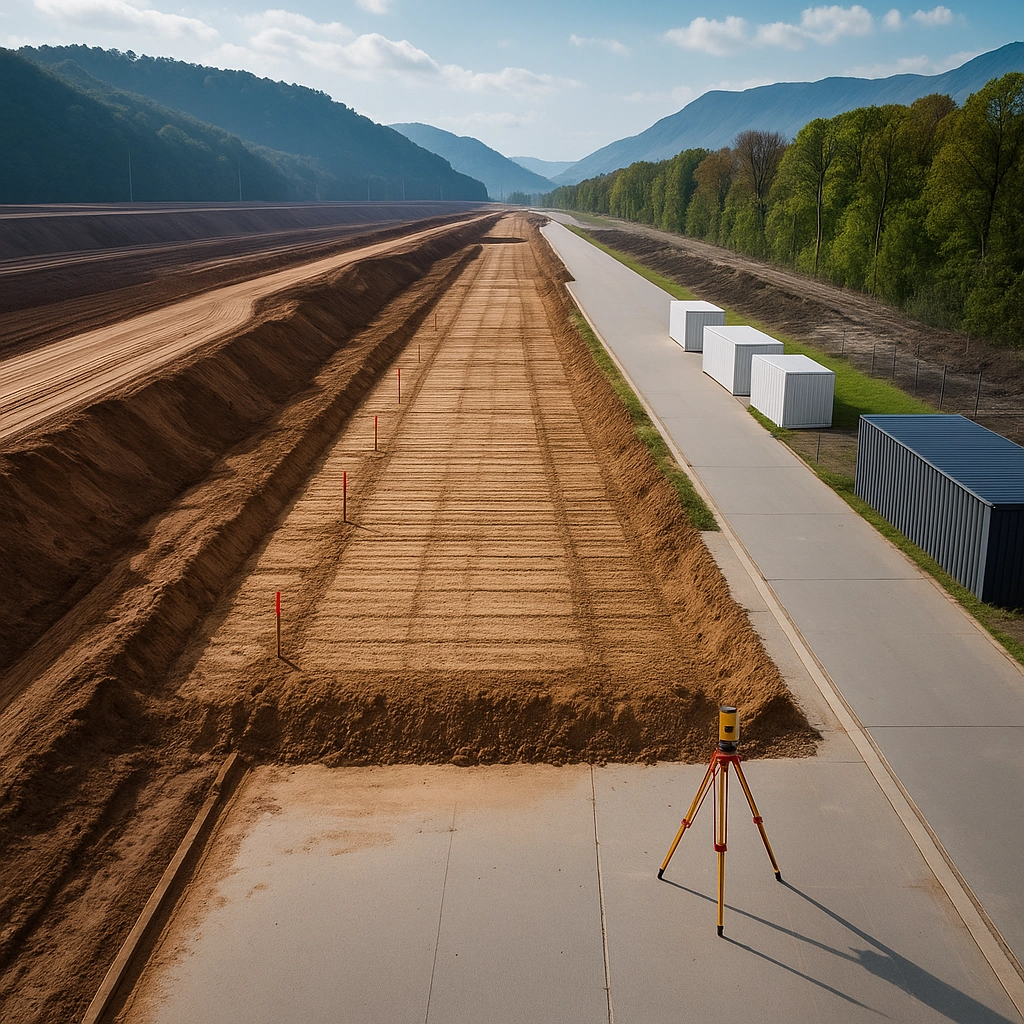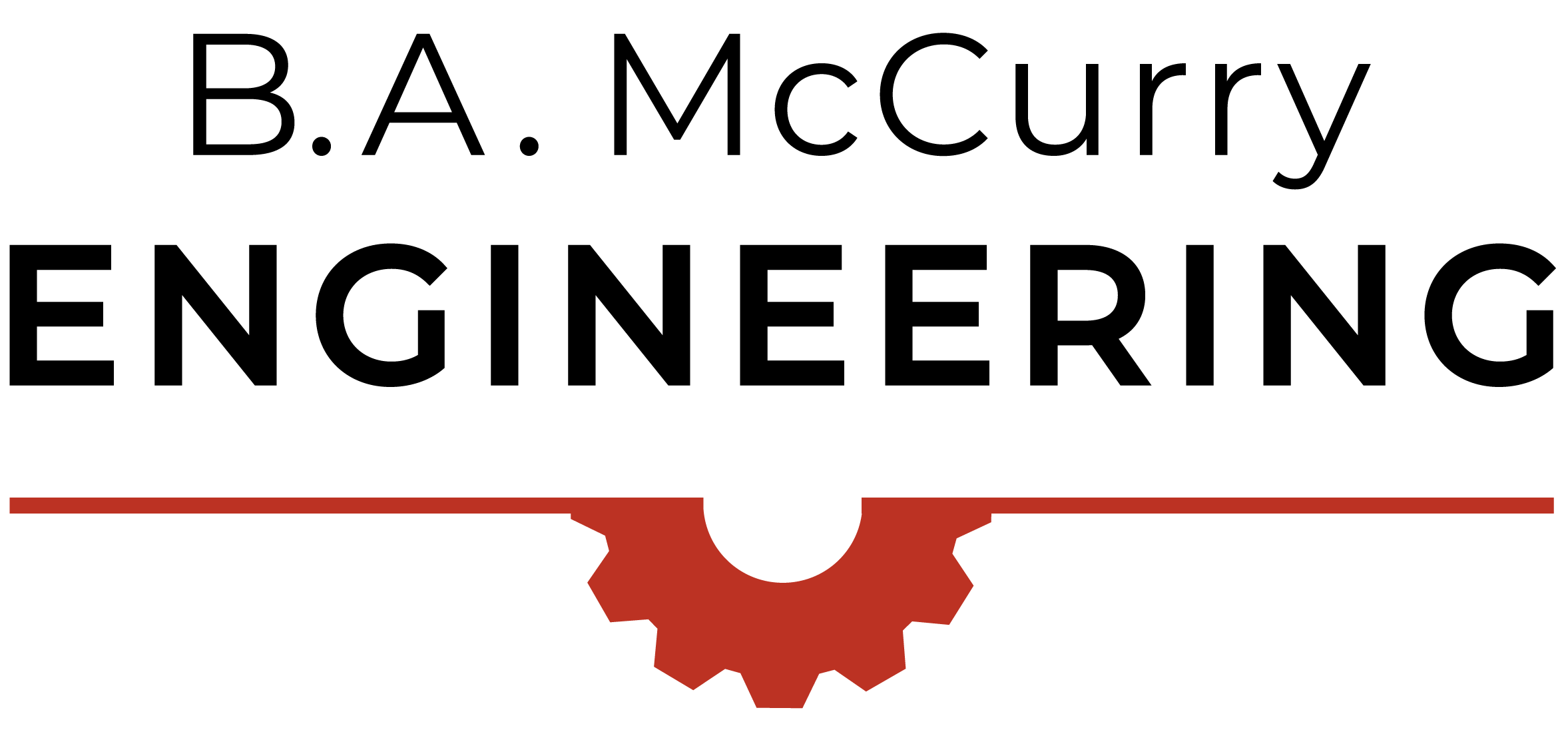Understanding the Foundation of Your Success
Every successful construction project begins below the surface. Before the first wall rises or foundation is poured, understanding what lies beneath your feet can make the difference between a structure that stands the test of time and one that faces costly, even dangerous problems down the road.
That’s where geotechnical engineering comes in—a specialized field that many property owners and developers don’t fully understand until they face issues that could have been prevented. At B.A. McCurry Engineering, we believe knowledge is power, especially when it comes to the ground beneath your investment.
What Exactly Is Geotechnical Engineering?
Geotechnical engineering is a specialized branch of civil engineering that focuses on the behavior of earth materials. In simpler terms, it’s the science of understanding how soil, rock, and groundwater will interact with your construction project.
Unlike other engineering disciplines that focus on the structures themselves, geotechnical engineering examines the foundation upon which everything rests. Geotechnical engineers study:
- Soil composition and characteristics
- Rock formations and stability
- Groundwater conditions and movement
- Earth material strength and compressibility
- Slope stability and potential land movement
By analyzing these elements, geotechnical engineers can predict how the ground will respond to the weight and forces of your structure, how it might settle over time, and what risks might exist at your specific site.

The Core Components of Geotechnical Engineering
Site Investigation
Every geotechnical project begins with thorough site investigation. This can involve preconstruction evaluation by digging test pits for compaction analysis, analyzing groundwater conditions, and examining the geological history of the area. These investigations help engineers understand what they’re working with before any design decisions are made.
Laboratory Testing
Once samples are collected, they undergo rigorous laboratory testing to determine critical properties like:
- Soil classification and grain size distribution
- Moisture content and density
- Shear strength and compressibility
Analysis and Design
Using data from investigations and testing, geotechnical engineers develop models to predict how earth materials will behave under various conditions. This allows them to design appropriate foundations, retaining structures, and earthworks that will perform safely throughout the life of your project.
Construction Recommendations
Finally, geotechnical engineers provide specific recommendations for construction techniques, materials, and monitoring protocols to ensure the project proceeds according to design parameters.
Why Your Project Needs Geotechnical Engineering
The question isn’t whether your project needs geotechnical engineering—it’s how much you’re willing to risk by skipping this crucial step. Here’s why this service is essential:
1. Preventing Structural Failures
The most obvious reason is also the most critical: preventing catastrophic failures. Buildings constructed without proper geotechnical investigation risk:
- Foundation settlement and cracking
- Structural damage from expansive soils
- Slope failures and landslides
- Sinkholes and subsidence
These aren’t just theoretical concerns. In North Carolina, varying soil conditions from the mountains to the coast create diverse challenges that require professional assessment.
2. Optimizing Design and Reducing Costs
Many people view geotechnical engineering as an added expense, but the reality is quite different. A thorough geotechnical investigation often leads to:
- More efficient foundation designs
- Reduced material costs
- Fewer change orders during construction
- Lower long-term maintenance expenses
In many cases, the cost of geotechnical services is recovered multiple times over through optimized design alone. As the saying goes: “Measure twice, cut once.”

3. Compliance with Building Codes and Regulations
Building codes exist for good reason, and most jurisdictions require geotechnical investigations for commercial buildings and many residential projects. Meeting these requirements isn’t just about checking boxes—it’s about ensuring public safety and project viability.
4. Managing Environmental Considerations
Today’s projects must consider environmental impacts more than ever before. Geotechnical engineering helps identify:
- Groundwater protection measures
- Erosion control requirements
Common Geotechnical Challenges in North Carolina
North Carolina’s diverse geography creates unique geotechnical challenges across the state:
In the Mountains:
- Steep slopes requiring stability analysis
- Shallow bedrock complicating excavation
- Variable soil depths that can cause differential settlement
In the Piedmont:
- Residual soils with unpredictable properties
- Saprolite (weathered rock) that behaves differently than typical soils
- Shrink-swell potential in clay-rich areas
In the Coastal Plain:
- High groundwater tables
- Organic soils with poor bearing capacity
- Potential for sinkholes in limestone areas
Each of these conditions requires specialized knowledge and appropriate testing to address properly. What works in Asheville won’t necessarily work in Wilmington—a one-size-fits-all approach simply doesn’t apply to geotechnical engineering.
The Geotechnical Investigation Process: What to Expect
When you engage B.A. McCurry Engineering for geotechnical services, here’s what you can expect:
- Initial Consultation: We’ll discuss your project goals, timeline, and specific concerns.
- Preliminary Research: Before setting foot on your site, we review existing geological maps, and historical information.
- Field Investigation: Our team pre-evaluation team conducts soil test pits, or other appropriate investigation methods based on your project requirements. (on request)
- Laboratory Testing: Soil samples undergo appropriate testing to determine critical engineering properties.
- Analysis: We analyze the data to develop recommendations specific to your project.
- Reporting: You’ll receive a comprehensive report detailing our findings and recommendations, written in clear language that helps you make informed decisions.
- Ongoing Support: Unlike some firms that disappear after delivering a report, we remain available to answer questions and provide guidance throughout your project.

Real-World Applications: When Geotechnical Engineering Makes a Difference
New Construction
Before breaking ground on any new building, understanding subsurface conditions allows for appropriate foundation design. This might mean the difference between a simple slab-on-grade foundation or the need for deep foundations like piers or piles—a significant cost consideration.
Renovation and Expansion
Adding onto existing structures requires understanding not just new soil conditions, but how additional loads will affect existing foundations. A geotechnical investigation can prevent damage to both new and existing portions of your building.
Infrastructure Development
Roads, bridges, retaining walls, and utilities all interact with earth materials in ways that require specialized analysis. Proper geotechnical investigation prevents premature deterioration and failure of these critical systems.
Problem Solving
When issues arise—cracks appear, floors become uneven, or walls begin to lean—geotechnical engineers can determine the root causes and develop effective remediation strategies.
The B.A. McCurry Engineering Difference
At B.A. McCurry Engineering, we approach geotechnical services differently. Our philosophy centers on:
- Clarity: We explain complex technical findings in terms you can understand and apply.
- Thoroughness: We don’t cut corners on investigation or analysis.
- Practicality: Our recommendations balance technical ideals with real-world constraints.
- Partnership: We see ourselves as partners in your project’s success, not just service providers.
Making Informed Decisions
The ground beneath your project won’t change its properties to accommodate your plans—but with proper geotechnical engineering, your plans can accommodate the ground. This proactive approach transforms what could be a liability into a foundation for success.
Whether you’re planning a single-family home, commercial development, or infrastructure project, geotechnical engineering isn’t just a box to check—it’s an investment in your project’s long-term success.
Ready to build on solid ground? Contact B.A. McCurry Engineering to discuss your project’s geotechnical needs. Your future self will thank you for the foresight.
